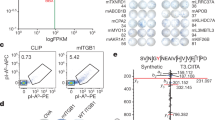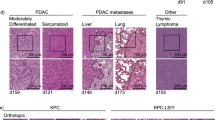Abstract
A majority of cancer deaths are because of an uncontrolled relapse of the disease despite initial remission after therapy, asking for strategies to control tumour cells in the long term. Adoptive therapy with chimeric antigen receptor (CAR)-redirected T cells showed promising success in primary tumour elimination; the capacity of such engineered T cells to establish enduring tumour protection is currently a matter of discussion, in particular as most targeted ‘tumour-associated antigens’ are self-antigens. To address the issue in a clinically relevant model that closely mimics the human situation, we recorded rejection of carcinoembryonic antigen (CEA)-positive pancreatic tumours in the CEA transgenic mouse that expressed CEA as self-antigen in healthy cells of the gastrointestinal tract. Adoptive therapy with CD8+ T cells, which were redirected by a CEA-specific, low-affinity CAR with CD3ζ endodomain, eliminated CEA+ tumours in a primary response; cured mice produced an efficient recall response in the long term towards CEA+ tumour cells upon rechallenge. Secondary tumour rejection was CEA specific, mediated by engineered T cells and did not require host T cells. No toxicity towards healthy tissues with CEA expression was recorded. Data indicate that adoptive therapy with engineered T cells can establish self-antigen-specific tumour protection in the long term without autoimmunity.
This is a preview of subscription content, access via your institution
Access options
Subscribe to this journal
Receive 12 print issues and online access
$259.00 per year
only $21.58 per issue
Buy this article
- Purchase on Springer Link
- Instant access to full article PDF
Prices may be subject to local taxes which are calculated during checkout






Similar content being viewed by others
References
Yang L, Carbone DP . Tumour-host immune interactions and dendritic cell dysfunction. Adv Cancer Res 2004; 92: 13–27.
Eshhar Z . The T-body approach: redirecting T cells with antibody specificity. Handb Exp Pharmacol 2008; 181: 329–342.
Hombach A, Abken H . Costimulation tunes tumour-specific activation of redirected T cells in adoptive immunotherapy. Cancer Immunol Immunother 2007; 56: 731–737.
Kohn DB, Dotti G, Brentjens R, Savoldo B, Jensen M, Cooper LJ et al. CARs on track in the clinic. Mol Ther 2011; 19: 432–438.
Jena B, Dotti G, Cooper LJ . Redirecting T-cell specificity by introducing a tumour-specific chimeric antigen receptor. Blood 2010; 116: 1035–1044.
Porter DL, Levine BL, Kalos M, Bagg A, June CH . Chimeric antigen receptor-modified T cells in chronic lymphoid leukemia. N Engl J Med 2011; 365: 725–733.
Robbins PF, Dudley ME, Wunderlich J, El-Gamil M, Li YF, Zhou J . Cutting edge: persistence of transferred lymphocyte clonotypes correlates with cancer regression in patients receiving cell transfer therapy. J Immunol 2004; 173: 7125–7130.
Milone MC, Fish JD, Carpenito C, Carroll RG, Binder GK, Teachey D et al. Chimeric receptors containing CD137 signal transduction domains mediate enhanced survival of T cells and increased antileukemic efficacy in vivo. Mol Ther 2009; 17: 1453–1464.
Kalos M, Levine BL, Porter DL, Katz S, Grupp SA, Bagg A et al. T cells with chimeric antigen receptors have potent antitumour effects and can establish memory in patients with advanced leukemia. Sci Transl Med 2011; 3: 95r73.
Moeller M, Kershaw MH, Cameron R, Westwood JA, Trapani JA, Smyth MJ et al. Sustained antigen-specific antitumour recall response mediated by gene-modified CD4+ T helper-1 and CD8+ T cells. Cancer Res 2007; 67: 11428–11437.
Eades-Perner AM, van der Putten H, Hirth A, Thompson J, Neumaier M, von Kleist S et al. Mice transgenic for the human carcinoembryonic antigen gene maintain its spatiotemporal expression pattern. Cancer Res 1994; 54: 4169–4776.
Wang LX, Westwood JA, Moeller M, Duong CP, Wei WZ, Malaterre J et al. Tumor ablation by gene-modified T cells in the absence of autoimmunity. Cancer Res 2010; 70: 9591–9598.
Hombach A, Koch D, Sircar R, Heuser C, Diehl V, Kruis W et al. A chimeric receptor that selectively targets membrane-bound carcinoembryonic antigen (mCEA) in presence of soluble CEA. Gene Therapy 1999; 6: 300–304.
Savoldo B, Ramos CA, Liu E, Mims MP, Keating MJ, Carrum G et al. CD28 costimulation improves expansion and persistence of chimeric antigen receptor-modified T cells in lymphoma patients. J Clin Invest 2011; 121: 1822–1826.
Klebanoff CA, Khong HT, Antony PA, Palmer DC, Restifo NP . Sinks, suppressors and antigen presenters: how lymphodepletion enhances T cell-mediated tumour immunotherapy. [published erratum appears in Trends Immunol; 26: 298] Trends Immunol 2005; 26: 111–117.
de Witte MA, Bendle GM, van den Boom MD, Coccoris M, Schell TD, Tevethia SS et al. TCR gene therapy of spontaneous prostate carcinoma requires in vivo T cell activation. J Immunol 2008; 181: 2563–2571.
Moeller M, Haynes NM, Kershaw MH, Jackson JT, Teng MW, Sreet SE et al. Adoptive transfer of gene-engineered CD4+ helper T cells induces potent primary and secondary tumour rejection. Blood 2005; 106: 2995–3003.
Gyobu H, Tsuji T, Suzuki Y, Ohkuri T, Chamoto K, Kuroki M et al. Generation and targeting of human tumour-specific Tc1 and Th1 cells transduced with a lentivirus containing a chimeric immunoglobulin T-cell receptor. Cancer Res 2004; 64: 1490–1495.
Hanson HL, Donermeyer DL, Ikeda H, White JM, Shankaran V, Old LJ et al. Eradication of established tumours by CD8+ T cell adoptive immunotherapy. Immunity 2000; 13: 265–276.
Brentjens RJ, Latouche JB, Santos E, Marti F, Gong MC, Lyddane C et al. Eradication of systemic B-cell tumours by genetically targeted human T lymphocytes co-stimulated by CD80 and interleukin-15. Nat Med 2003; 9: 279–286.
Saha A, Chatterjee SK, Foon KA, Bhattacharya-Chatterjee M . Anti-idiotype antibody induced cellular immunity in mice transgenic for human carcinoembryonic antigen. Immunology 2006; 118: 483–496.
Saha A, Chatterjee SK, Foon KA, Primus FJ, Sreedharan S, Mohanty K et al. Dendritic cells pulsed with an anti-idiotype antibody mimicking carcinoembryonic antigen (CEA) can reverse immunological tolerance to CEA and induce antitumour immunity in CEA transgenic mice. Cancer Res 2004; 64: 4995–5003.
Chmielewski M, Kopecky C, Hombach A, Abken H . IL-12 release by engineered T cells expressing chimeric antigen receptors can effectively muster an antigen-independent macrophage response on tumour cells that shut down tumour antigen expression. Cancer Res 2011; 71: 5697–5706.
Hinoda Y, Neumaier M, Hefta SA, Drzeniek Z, Wagener C, Shively L et al. Molecular cloning of a cDNA coding biliary glycoprotein I: primary structure of a glycoprotein immunologically crossreactive with carcinoembryonic antigen. Proc Natl Acad Sci USA 1988; 85: 6959–6963.
Corbett TH, Roberts BJ, Leopold WR, Peckham JC, Wilkoff LJ, Griswold Jr DP et al. Induction and chemotherapeutic response of two transplantable ductal adenocarcinomas of the pancreas in C57BL/6 mice. Cancer Res 1984; 44: 717–726.
Acknowledgements
We thank Dr Inga Wedemeyer, Institute of Pathology, University Hospital Cologne, for re-evaluating tissue slides and Danuta Chrobok, Nicole Hoffmann, Frank Steiger and Samir Tawardos for technical assistance. This study was supported by grants from Deutsche Krebshilfe, Bonn, Germany; Else Kröner Fresenius-Stiftung, Homburg v.d.H., Germany; Deutsche Forschungsgemeinschaft, Bonn, Germany; and Fortune program of the Medical Faculty of the University of Cologne.
Author information
Authors and Affiliations
Corresponding author
Ethics declarations
Competing interests
The authors declare no conflict of interest.
Rights and permissions
About this article
Cite this article
Chmielewski, M., Rappl, G., Hombach, A. et al. T cells redirected by a CD3ζ chimeric antigen receptor can establish self-antigen-specific tumour protection in the long term. Gene Ther 20, 177–186 (2013). https://doi.org/10.1038/gt.2012.21
Received:
Revised:
Accepted:
Published:
Issue Date:
DOI: https://doi.org/10.1038/gt.2012.21
Keywords
This article is cited by
-
Treatment of solid tumors with chimeric antigen receptor-engineered T cells: current status and future prospects
Science China Life Sciences (2016)



